Global Business Strategy of Inditex: A Case Analysis
VerifiedAdded on 2023/01/11
|14
|4623
|79
AI Summary
This report provides a case analysis of the global business strategy of Inditex, a Spanish multinational clothing company. It explores the company's history, key milestones, international strategies, and recommendations for further success in the international market.
Contribute Materials
Your contribution can guide someone’s learning journey. Share your
documents today.

Secure Best Marks with AI Grader
Need help grading? Try our AI Grader for instant feedback on your assignments.
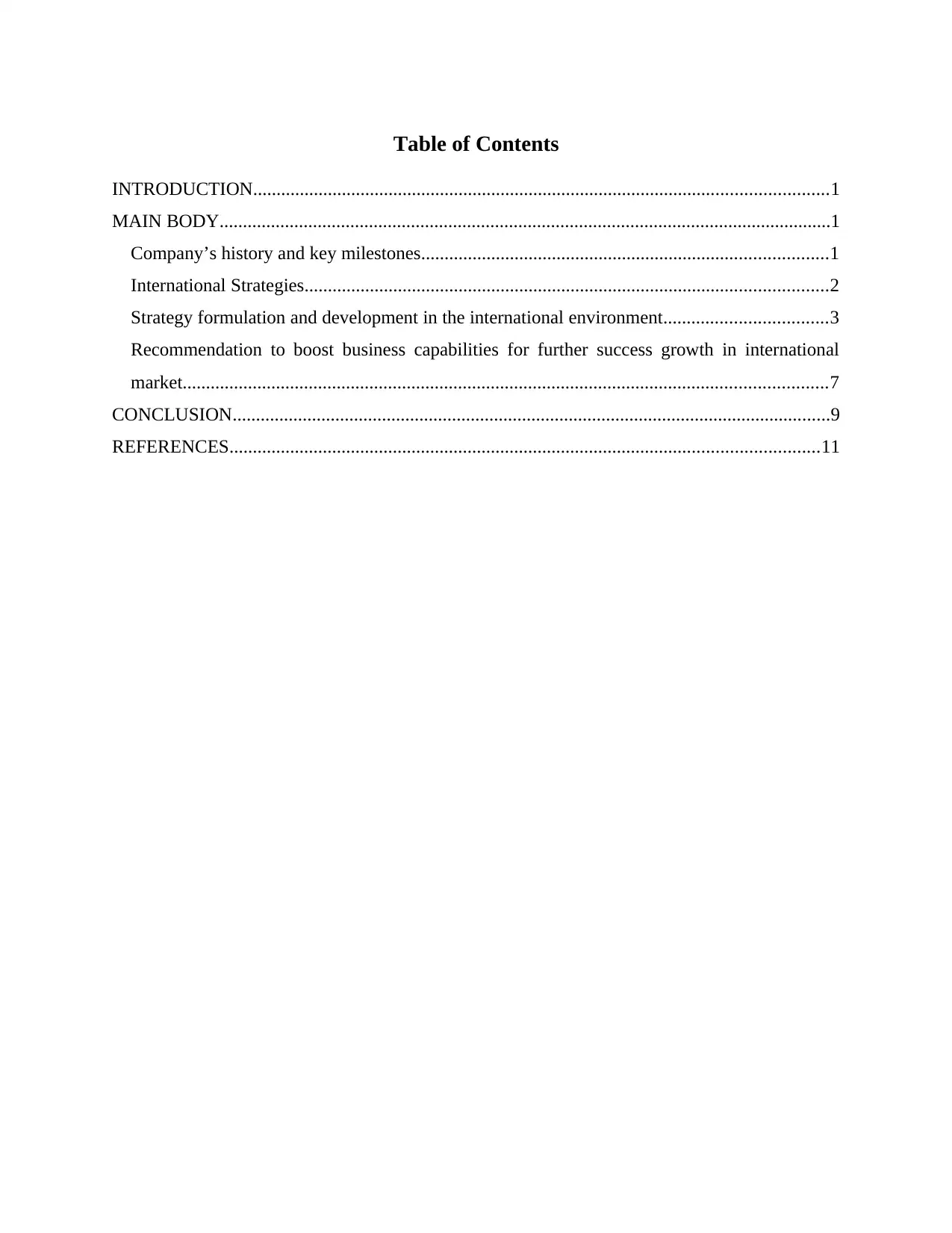
Table of Contents
INTRODUCTION...........................................................................................................................1
MAIN BODY...................................................................................................................................1
Company’s history and key milestones.......................................................................................1
International Strategies................................................................................................................2
Strategy formulation and development in the international environment...................................3
Recommendation to boost business capabilities for further success growth in international
market..........................................................................................................................................7
CONCLUSION................................................................................................................................9
REFERENCES..............................................................................................................................11
INTRODUCTION...........................................................................................................................1
MAIN BODY...................................................................................................................................1
Company’s history and key milestones.......................................................................................1
International Strategies................................................................................................................2
Strategy formulation and development in the international environment...................................3
Recommendation to boost business capabilities for further success growth in international
market..........................................................................................................................................7
CONCLUSION................................................................................................................................9
REFERENCES..............................................................................................................................11

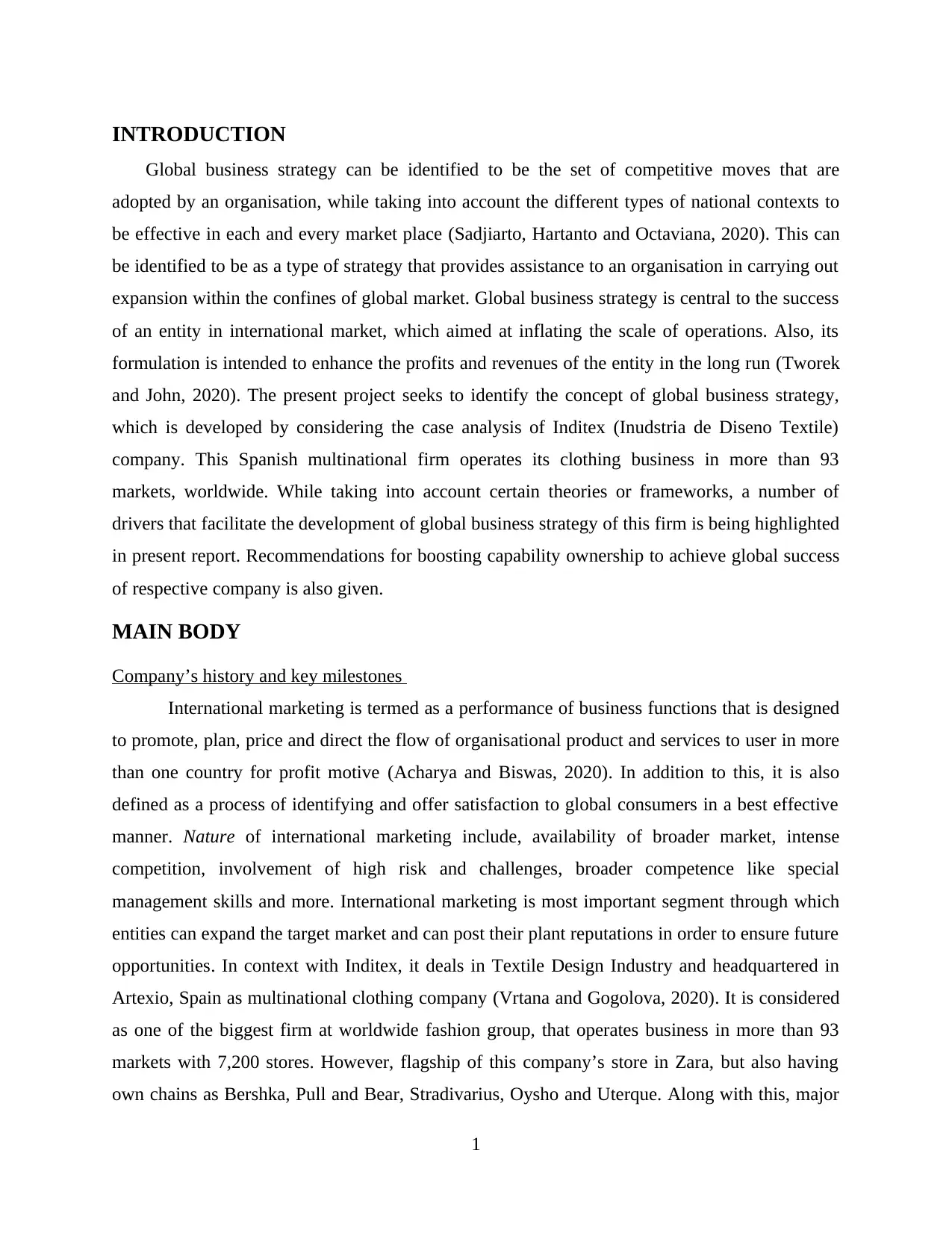
INTRODUCTION
Global business strategy can be identified to be the set of competitive moves that are
adopted by an organisation, while taking into account the different types of national contexts to
be effective in each and every market place (Sadjiarto, Hartanto and Octaviana, 2020). This can
be identified to be as a type of strategy that provides assistance to an organisation in carrying out
expansion within the confines of global market. Global business strategy is central to the success
of an entity in international market, which aimed at inflating the scale of operations. Also, its
formulation is intended to enhance the profits and revenues of the entity in the long run (Tworek
and John, 2020). The present project seeks to identify the concept of global business strategy,
which is developed by considering the case analysis of Inditex (Inudstria de Diseno Textile)
company. This Spanish multinational firm operates its clothing business in more than 93
markets, worldwide. While taking into account certain theories or frameworks, a number of
drivers that facilitate the development of global business strategy of this firm is being highlighted
in present report. Recommendations for boosting capability ownership to achieve global success
of respective company is also given.
MAIN BODY
Company’s history and key milestones
International marketing is termed as a performance of business functions that is designed
to promote, plan, price and direct the flow of organisational product and services to user in more
than one country for profit motive (Acharya and Biswas, 2020). In addition to this, it is also
defined as a process of identifying and offer satisfaction to global consumers in a best effective
manner. Nature of international marketing include, availability of broader market, intense
competition, involvement of high risk and challenges, broader competence like special
management skills and more. International marketing is most important segment through which
entities can expand the target market and can post their plant reputations in order to ensure future
opportunities. In context with Inditex, it deals in Textile Design Industry and headquartered in
Artexio, Spain as multinational clothing company (Vrtana and Gogolova, 2020). It is considered
as one of the biggest firm at worldwide fashion group, that operates business in more than 93
markets with 7,200 stores. However, flagship of this company’s store in Zara, but also having
own chains as Bershka, Pull and Bear, Stradivarius, Oysho and Uterque. Along with this, major
1
Global business strategy can be identified to be the set of competitive moves that are
adopted by an organisation, while taking into account the different types of national contexts to
be effective in each and every market place (Sadjiarto, Hartanto and Octaviana, 2020). This can
be identified to be as a type of strategy that provides assistance to an organisation in carrying out
expansion within the confines of global market. Global business strategy is central to the success
of an entity in international market, which aimed at inflating the scale of operations. Also, its
formulation is intended to enhance the profits and revenues of the entity in the long run (Tworek
and John, 2020). The present project seeks to identify the concept of global business strategy,
which is developed by considering the case analysis of Inditex (Inudstria de Diseno Textile)
company. This Spanish multinational firm operates its clothing business in more than 93
markets, worldwide. While taking into account certain theories or frameworks, a number of
drivers that facilitate the development of global business strategy of this firm is being highlighted
in present report. Recommendations for boosting capability ownership to achieve global success
of respective company is also given.
MAIN BODY
Company’s history and key milestones
International marketing is termed as a performance of business functions that is designed
to promote, plan, price and direct the flow of organisational product and services to user in more
than one country for profit motive (Acharya and Biswas, 2020). In addition to this, it is also
defined as a process of identifying and offer satisfaction to global consumers in a best effective
manner. Nature of international marketing include, availability of broader market, intense
competition, involvement of high risk and challenges, broader competence like special
management skills and more. International marketing is most important segment through which
entities can expand the target market and can post their plant reputations in order to ensure future
opportunities. In context with Inditex, it deals in Textile Design Industry and headquartered in
Artexio, Spain as multinational clothing company (Vrtana and Gogolova, 2020). It is considered
as one of the biggest firm at worldwide fashion group, that operates business in more than 93
markets with 7,200 stores. However, flagship of this company’s store in Zara, but also having
own chains as Bershka, Pull and Bear, Stradivarius, Oysho and Uterque. Along with this, major
1
Secure Best Marks with AI Grader
Need help grading? Try our AI Grader for instant feedback on your assignments.
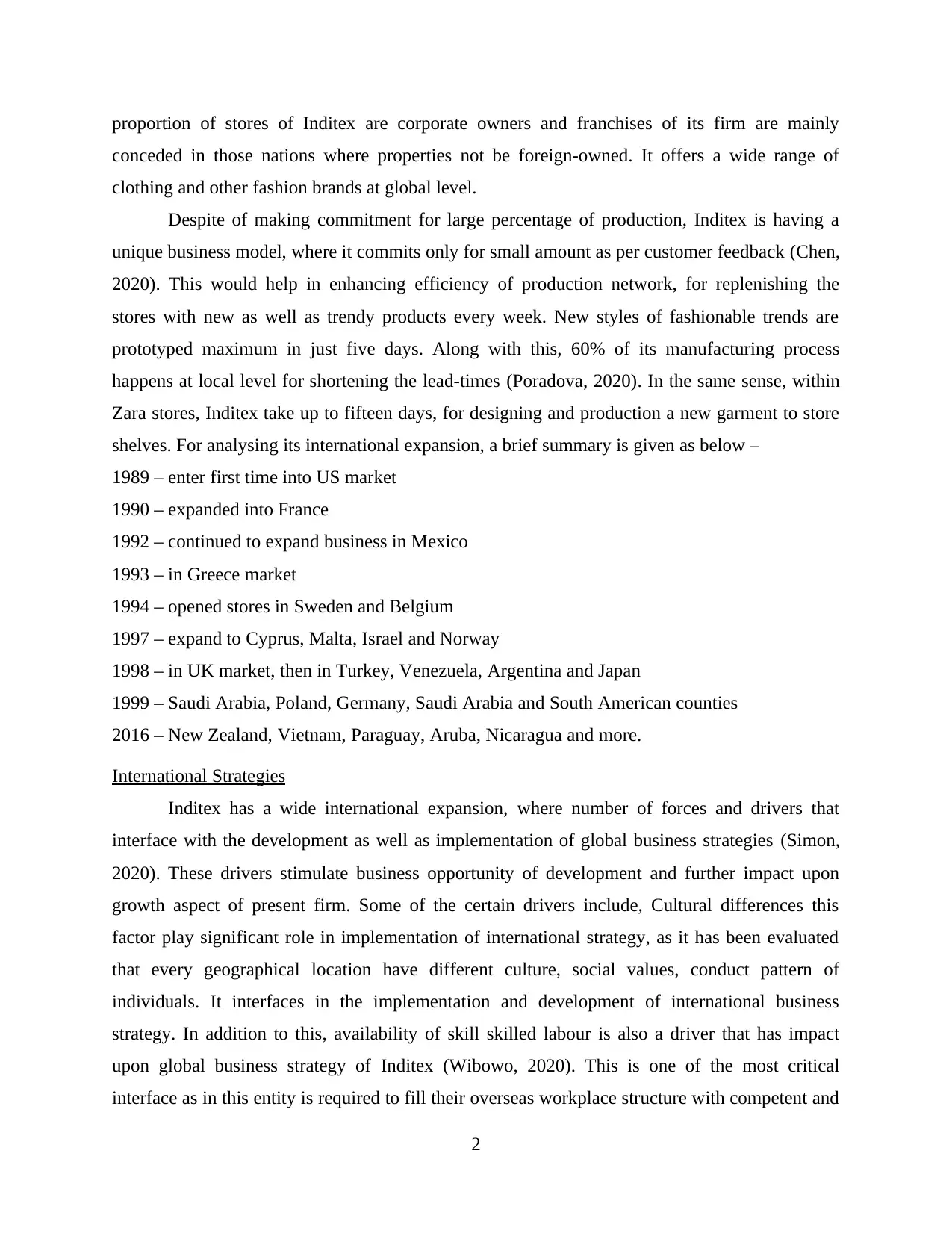
proportion of stores of Inditex are corporate owners and franchises of its firm are mainly
conceded in those nations where properties not be foreign-owned. It offers a wide range of
clothing and other fashion brands at global level.
Despite of making commitment for large percentage of production, Inditex is having a
unique business model, where it commits only for small amount as per customer feedback (Chen,
2020). This would help in enhancing efficiency of production network, for replenishing the
stores with new as well as trendy products every week. New styles of fashionable trends are
prototyped maximum in just five days. Along with this, 60% of its manufacturing process
happens at local level for shortening the lead-times (Poradova, 2020). In the same sense, within
Zara stores, Inditex take up to fifteen days, for designing and production a new garment to store
shelves. For analysing its international expansion, a brief summary is given as below –
1989 – enter first time into US market
1990 – expanded into France
1992 – continued to expand business in Mexico
1993 – in Greece market
1994 – opened stores in Sweden and Belgium
1997 – expand to Cyprus, Malta, Israel and Norway
1998 – in UK market, then in Turkey, Venezuela, Argentina and Japan
1999 – Saudi Arabia, Poland, Germany, Saudi Arabia and South American counties
2016 – New Zealand, Vietnam, Paraguay, Aruba, Nicaragua and more.
International Strategies
Inditex has a wide international expansion, where number of forces and drivers that
interface with the development as well as implementation of global business strategies (Simon,
2020). These drivers stimulate business opportunity of development and further impact upon
growth aspect of present firm. Some of the certain drivers include, Cultural differences this
factor play significant role in implementation of international strategy, as it has been evaluated
that every geographical location have different culture, social values, conduct pattern of
individuals. It interfaces in the implementation and development of international business
strategy. In addition to this, availability of skill skilled labour is also a driver that has impact
upon global business strategy of Inditex (Wibowo, 2020). This is one of the most critical
interface as in this entity is required to fill their overseas workplace structure with competent and
2
conceded in those nations where properties not be foreign-owned. It offers a wide range of
clothing and other fashion brands at global level.
Despite of making commitment for large percentage of production, Inditex is having a
unique business model, where it commits only for small amount as per customer feedback (Chen,
2020). This would help in enhancing efficiency of production network, for replenishing the
stores with new as well as trendy products every week. New styles of fashionable trends are
prototyped maximum in just five days. Along with this, 60% of its manufacturing process
happens at local level for shortening the lead-times (Poradova, 2020). In the same sense, within
Zara stores, Inditex take up to fifteen days, for designing and production a new garment to store
shelves. For analysing its international expansion, a brief summary is given as below –
1989 – enter first time into US market
1990 – expanded into France
1992 – continued to expand business in Mexico
1993 – in Greece market
1994 – opened stores in Sweden and Belgium
1997 – expand to Cyprus, Malta, Israel and Norway
1998 – in UK market, then in Turkey, Venezuela, Argentina and Japan
1999 – Saudi Arabia, Poland, Germany, Saudi Arabia and South American counties
2016 – New Zealand, Vietnam, Paraguay, Aruba, Nicaragua and more.
International Strategies
Inditex has a wide international expansion, where number of forces and drivers that
interface with the development as well as implementation of global business strategies (Simon,
2020). These drivers stimulate business opportunity of development and further impact upon
growth aspect of present firm. Some of the certain drivers include, Cultural differences this
factor play significant role in implementation of international strategy, as it has been evaluated
that every geographical location have different culture, social values, conduct pattern of
individuals. It interfaces in the implementation and development of international business
strategy. In addition to this, availability of skill skilled labour is also a driver that has impact
upon global business strategy of Inditex (Wibowo, 2020). This is one of the most critical
interface as in this entity is required to fill their overseas workplace structure with competent and
2
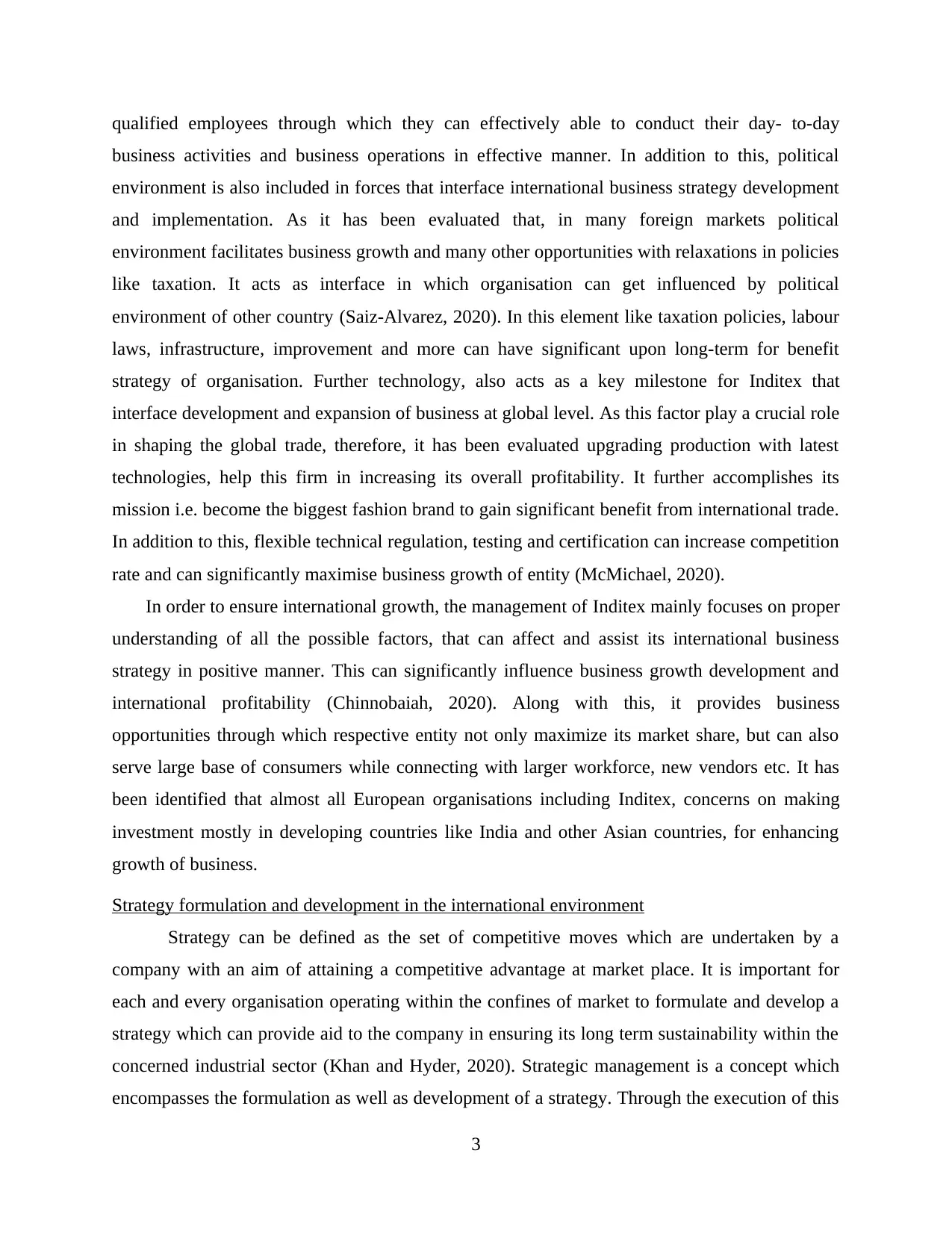
qualified employees through which they can effectively able to conduct their day- to-day
business activities and business operations in effective manner. In addition to this, political
environment is also included in forces that interface international business strategy development
and implementation. As it has been evaluated that, in many foreign markets political
environment facilitates business growth and many other opportunities with relaxations in policies
like taxation. It acts as interface in which organisation can get influenced by political
environment of other country (Saiz-Alvarez, 2020). In this element like taxation policies, labour
laws, infrastructure, improvement and more can have significant upon long-term for benefit
strategy of organisation. Further technology, also acts as a key milestone for Inditex that
interface development and expansion of business at global level. As this factor play a crucial role
in shaping the global trade, therefore, it has been evaluated upgrading production with latest
technologies, help this firm in increasing its overall profitability. It further accomplishes its
mission i.e. become the biggest fashion brand to gain significant benefit from international trade.
In addition to this, flexible technical regulation, testing and certification can increase competition
rate and can significantly maximise business growth of entity (McMichael, 2020).
In order to ensure international growth, the management of Inditex mainly focuses on proper
understanding of all the possible factors, that can affect and assist its international business
strategy in positive manner. This can significantly influence business growth development and
international profitability (Chinnobaiah, 2020). Along with this, it provides business
opportunities through which respective entity not only maximize its market share, but can also
serve large base of consumers while connecting with larger workforce, new vendors etc. It has
been identified that almost all European organisations including Inditex, concerns on making
investment mostly in developing countries like India and other Asian countries, for enhancing
growth of business.
Strategy formulation and development in the international environment
Strategy can be defined as the set of competitive moves which are undertaken by a
company with an aim of attaining a competitive advantage at market place. It is important for
each and every organisation operating within the confines of market to formulate and develop a
strategy which can provide aid to the company in ensuring its long term sustainability within the
concerned industrial sector (Khan and Hyder, 2020). Strategic management is a concept which
encompasses the formulation as well as development of a strategy. Through the execution of this
3
business activities and business operations in effective manner. In addition to this, political
environment is also included in forces that interface international business strategy development
and implementation. As it has been evaluated that, in many foreign markets political
environment facilitates business growth and many other opportunities with relaxations in policies
like taxation. It acts as interface in which organisation can get influenced by political
environment of other country (Saiz-Alvarez, 2020). In this element like taxation policies, labour
laws, infrastructure, improvement and more can have significant upon long-term for benefit
strategy of organisation. Further technology, also acts as a key milestone for Inditex that
interface development and expansion of business at global level. As this factor play a crucial role
in shaping the global trade, therefore, it has been evaluated upgrading production with latest
technologies, help this firm in increasing its overall profitability. It further accomplishes its
mission i.e. become the biggest fashion brand to gain significant benefit from international trade.
In addition to this, flexible technical regulation, testing and certification can increase competition
rate and can significantly maximise business growth of entity (McMichael, 2020).
In order to ensure international growth, the management of Inditex mainly focuses on proper
understanding of all the possible factors, that can affect and assist its international business
strategy in positive manner. This can significantly influence business growth development and
international profitability (Chinnobaiah, 2020). Along with this, it provides business
opportunities through which respective entity not only maximize its market share, but can also
serve large base of consumers while connecting with larger workforce, new vendors etc. It has
been identified that almost all European organisations including Inditex, concerns on making
investment mostly in developing countries like India and other Asian countries, for enhancing
growth of business.
Strategy formulation and development in the international environment
Strategy can be defined as the set of competitive moves which are undertaken by a
company with an aim of attaining a competitive advantage at market place. It is important for
each and every organisation operating within the confines of market to formulate and develop a
strategy which can provide aid to the company in ensuring its long term sustainability within the
concerned industrial sector (Khan and Hyder, 2020). Strategic management is a concept which
encompasses the formulation as well as development of a strategy. Through the execution of this
3
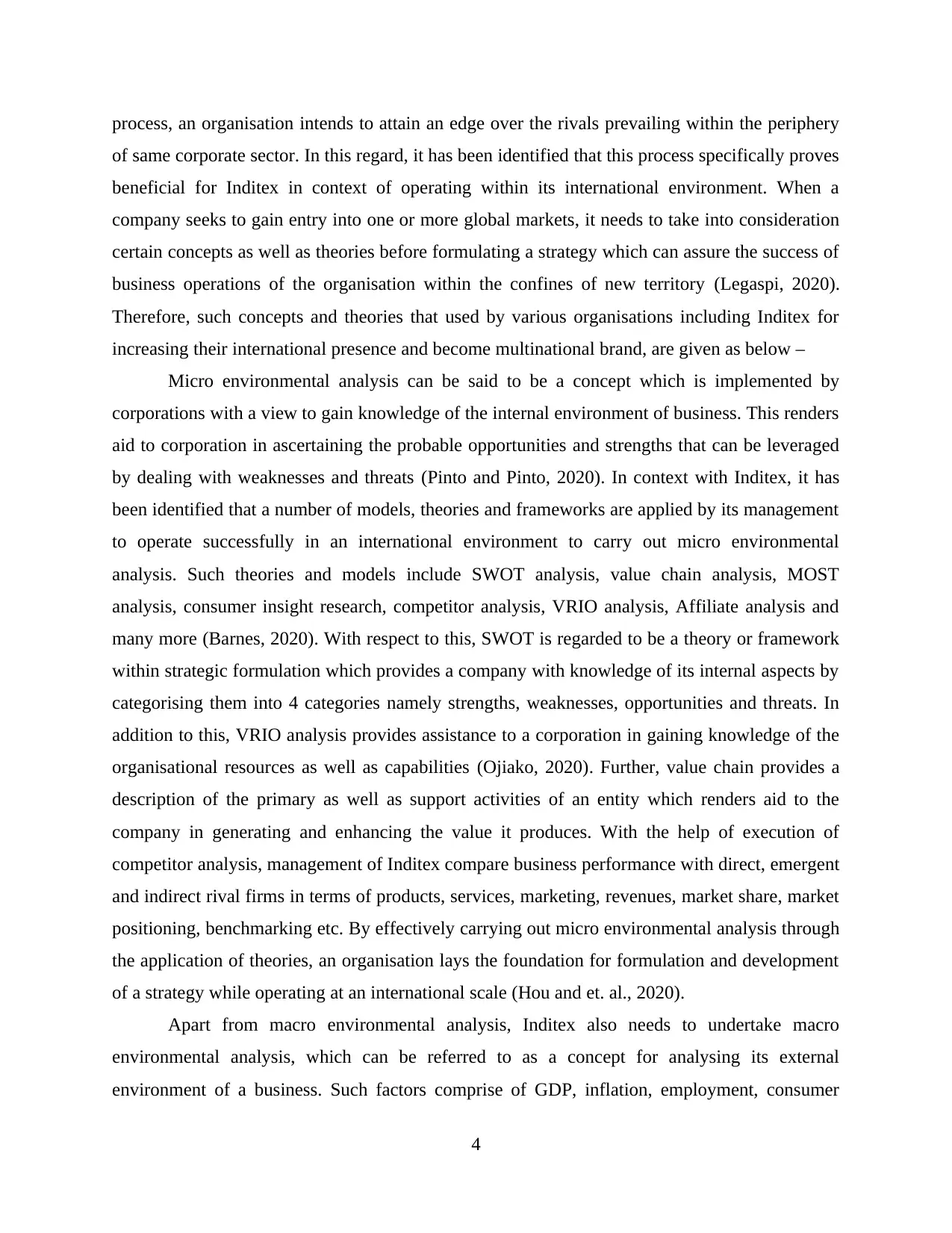
process, an organisation intends to attain an edge over the rivals prevailing within the periphery
of same corporate sector. In this regard, it has been identified that this process specifically proves
beneficial for Inditex in context of operating within its international environment. When a
company seeks to gain entry into one or more global markets, it needs to take into consideration
certain concepts as well as theories before formulating a strategy which can assure the success of
business operations of the organisation within the confines of new territory (Legaspi, 2020).
Therefore, such concepts and theories that used by various organisations including Inditex for
increasing their international presence and become multinational brand, are given as below –
Micro environmental analysis can be said to be a concept which is implemented by
corporations with a view to gain knowledge of the internal environment of business. This renders
aid to corporation in ascertaining the probable opportunities and strengths that can be leveraged
by dealing with weaknesses and threats (Pinto and Pinto, 2020). In context with Inditex, it has
been identified that a number of models, theories and frameworks are applied by its management
to operate successfully in an international environment to carry out micro environmental
analysis. Such theories and models include SWOT analysis, value chain analysis, MOST
analysis, consumer insight research, competitor analysis, VRIO analysis, Affiliate analysis and
many more (Barnes, 2020). With respect to this, SWOT is regarded to be a theory or framework
within strategic formulation which provides a company with knowledge of its internal aspects by
categorising them into 4 categories namely strengths, weaknesses, opportunities and threats. In
addition to this, VRIO analysis provides assistance to a corporation in gaining knowledge of the
organisational resources as well as capabilities (Ojiako, 2020). Further, value chain provides a
description of the primary as well as support activities of an entity which renders aid to the
company in generating and enhancing the value it produces. With the help of execution of
competitor analysis, management of Inditex compare business performance with direct, emergent
and indirect rival firms in terms of products, services, marketing, revenues, market share, market
positioning, benchmarking etc. By effectively carrying out micro environmental analysis through
the application of theories, an organisation lays the foundation for formulation and development
of a strategy while operating at an international scale (Hou and et. al., 2020).
Apart from macro environmental analysis, Inditex also needs to undertake macro
environmental analysis, which can be referred to as a concept for analysing its external
environment of a business. Such factors comprise of GDP, inflation, employment, consumer
4
of same corporate sector. In this regard, it has been identified that this process specifically proves
beneficial for Inditex in context of operating within its international environment. When a
company seeks to gain entry into one or more global markets, it needs to take into consideration
certain concepts as well as theories before formulating a strategy which can assure the success of
business operations of the organisation within the confines of new territory (Legaspi, 2020).
Therefore, such concepts and theories that used by various organisations including Inditex for
increasing their international presence and become multinational brand, are given as below –
Micro environmental analysis can be said to be a concept which is implemented by
corporations with a view to gain knowledge of the internal environment of business. This renders
aid to corporation in ascertaining the probable opportunities and strengths that can be leveraged
by dealing with weaknesses and threats (Pinto and Pinto, 2020). In context with Inditex, it has
been identified that a number of models, theories and frameworks are applied by its management
to operate successfully in an international environment to carry out micro environmental
analysis. Such theories and models include SWOT analysis, value chain analysis, MOST
analysis, consumer insight research, competitor analysis, VRIO analysis, Affiliate analysis and
many more (Barnes, 2020). With respect to this, SWOT is regarded to be a theory or framework
within strategic formulation which provides a company with knowledge of its internal aspects by
categorising them into 4 categories namely strengths, weaknesses, opportunities and threats. In
addition to this, VRIO analysis provides assistance to a corporation in gaining knowledge of the
organisational resources as well as capabilities (Ojiako, 2020). Further, value chain provides a
description of the primary as well as support activities of an entity which renders aid to the
company in generating and enhancing the value it produces. With the help of execution of
competitor analysis, management of Inditex compare business performance with direct, emergent
and indirect rival firms in terms of products, services, marketing, revenues, market share, market
positioning, benchmarking etc. By effectively carrying out micro environmental analysis through
the application of theories, an organisation lays the foundation for formulation and development
of a strategy while operating at an international scale (Hou and et. al., 2020).
Apart from macro environmental analysis, Inditex also needs to undertake macro
environmental analysis, which can be referred to as a concept for analysing its external
environment of a business. Such factors comprise of GDP, inflation, employment, consumer
4
Paraphrase This Document
Need a fresh take? Get an instant paraphrase of this document with our AI Paraphraser
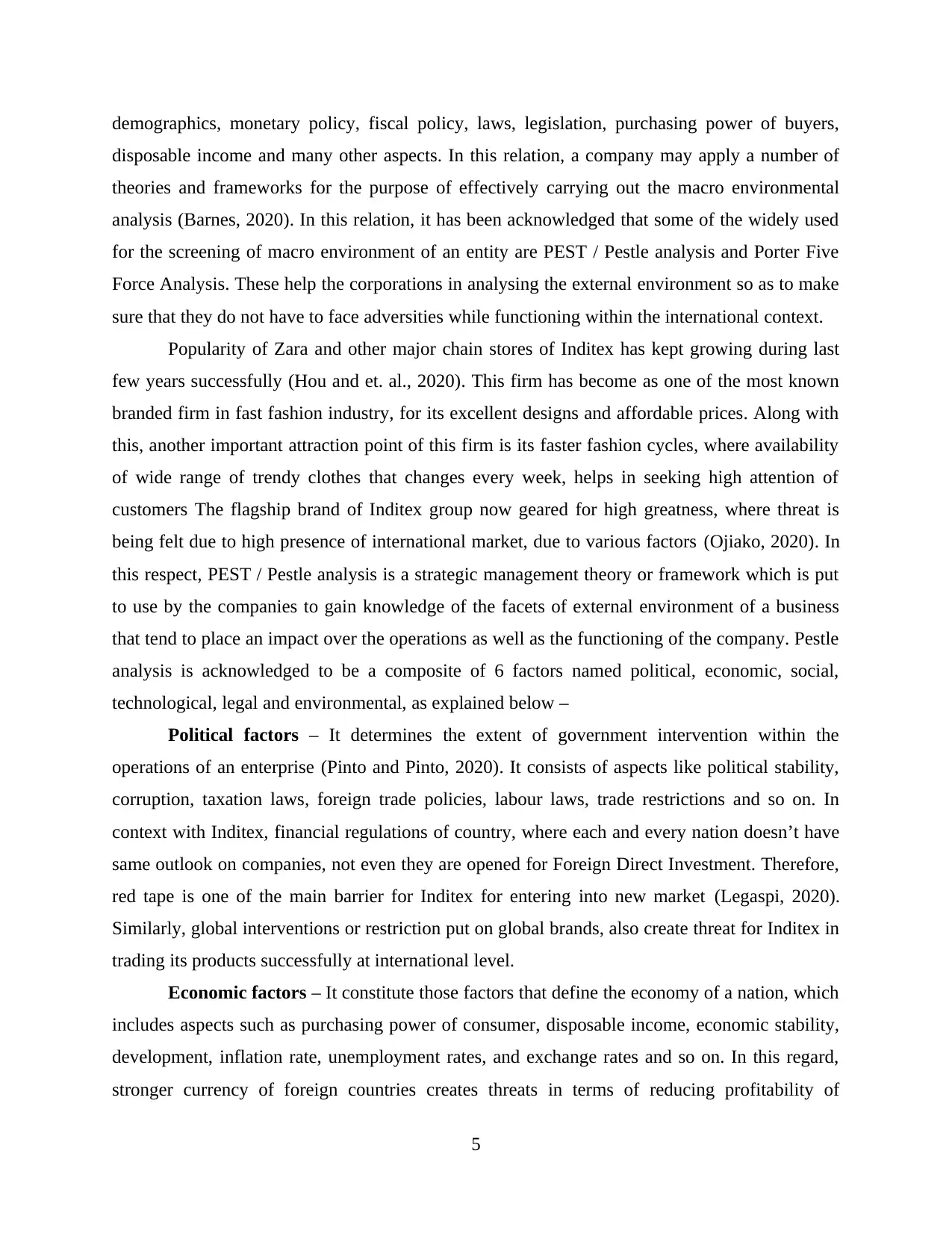
demographics, monetary policy, fiscal policy, laws, legislation, purchasing power of buyers,
disposable income and many other aspects. In this relation, a company may apply a number of
theories and frameworks for the purpose of effectively carrying out the macro environmental
analysis (Barnes, 2020). In this relation, it has been acknowledged that some of the widely used
for the screening of macro environment of an entity are PEST / Pestle analysis and Porter Five
Force Analysis. These help the corporations in analysing the external environment so as to make
sure that they do not have to face adversities while functioning within the international context.
Popularity of Zara and other major chain stores of Inditex has kept growing during last
few years successfully (Hou and et. al., 2020). This firm has become as one of the most known
branded firm in fast fashion industry, for its excellent designs and affordable prices. Along with
this, another important attraction point of this firm is its faster fashion cycles, where availability
of wide range of trendy clothes that changes every week, helps in seeking high attention of
customers The flagship brand of Inditex group now geared for high greatness, where threat is
being felt due to high presence of international market, due to various factors (Ojiako, 2020). In
this respect, PEST / Pestle analysis is a strategic management theory or framework which is put
to use by the companies to gain knowledge of the facets of external environment of a business
that tend to place an impact over the operations as well as the functioning of the company. Pestle
analysis is acknowledged to be a composite of 6 factors named political, economic, social,
technological, legal and environmental, as explained below –
Political factors – It determines the extent of government intervention within the
operations of an enterprise (Pinto and Pinto, 2020). It consists of aspects like political stability,
corruption, taxation laws, foreign trade policies, labour laws, trade restrictions and so on. In
context with Inditex, financial regulations of country, where each and every nation doesn’t have
same outlook on companies, not even they are opened for Foreign Direct Investment. Therefore,
red tape is one of the main barrier for Inditex for entering into new market (Legaspi, 2020).
Similarly, global interventions or restriction put on global brands, also create threat for Inditex in
trading its products successfully at international level.
Economic factors – It constitute those factors that define the economy of a nation, which
includes aspects such as purchasing power of consumer, disposable income, economic stability,
development, inflation rate, unemployment rates, and exchange rates and so on. In this regard,
stronger currency of foreign countries creates threats in terms of reducing profitability of
5
disposable income and many other aspects. In this relation, a company may apply a number of
theories and frameworks for the purpose of effectively carrying out the macro environmental
analysis (Barnes, 2020). In this relation, it has been acknowledged that some of the widely used
for the screening of macro environment of an entity are PEST / Pestle analysis and Porter Five
Force Analysis. These help the corporations in analysing the external environment so as to make
sure that they do not have to face adversities while functioning within the international context.
Popularity of Zara and other major chain stores of Inditex has kept growing during last
few years successfully (Hou and et. al., 2020). This firm has become as one of the most known
branded firm in fast fashion industry, for its excellent designs and affordable prices. Along with
this, another important attraction point of this firm is its faster fashion cycles, where availability
of wide range of trendy clothes that changes every week, helps in seeking high attention of
customers The flagship brand of Inditex group now geared for high greatness, where threat is
being felt due to high presence of international market, due to various factors (Ojiako, 2020). In
this respect, PEST / Pestle analysis is a strategic management theory or framework which is put
to use by the companies to gain knowledge of the facets of external environment of a business
that tend to place an impact over the operations as well as the functioning of the company. Pestle
analysis is acknowledged to be a composite of 6 factors named political, economic, social,
technological, legal and environmental, as explained below –
Political factors – It determines the extent of government intervention within the
operations of an enterprise (Pinto and Pinto, 2020). It consists of aspects like political stability,
corruption, taxation laws, foreign trade policies, labour laws, trade restrictions and so on. In
context with Inditex, financial regulations of country, where each and every nation doesn’t have
same outlook on companies, not even they are opened for Foreign Direct Investment. Therefore,
red tape is one of the main barrier for Inditex for entering into new market (Legaspi, 2020).
Similarly, global interventions or restriction put on global brands, also create threat for Inditex in
trading its products successfully at international level.
Economic factors – It constitute those factors that define the economy of a nation, which
includes aspects such as purchasing power of consumer, disposable income, economic stability,
development, inflation rate, unemployment rates, and exchange rates and so on. In this regard,
stronger currency of foreign countries creates threats in terms of reducing profitability of
5
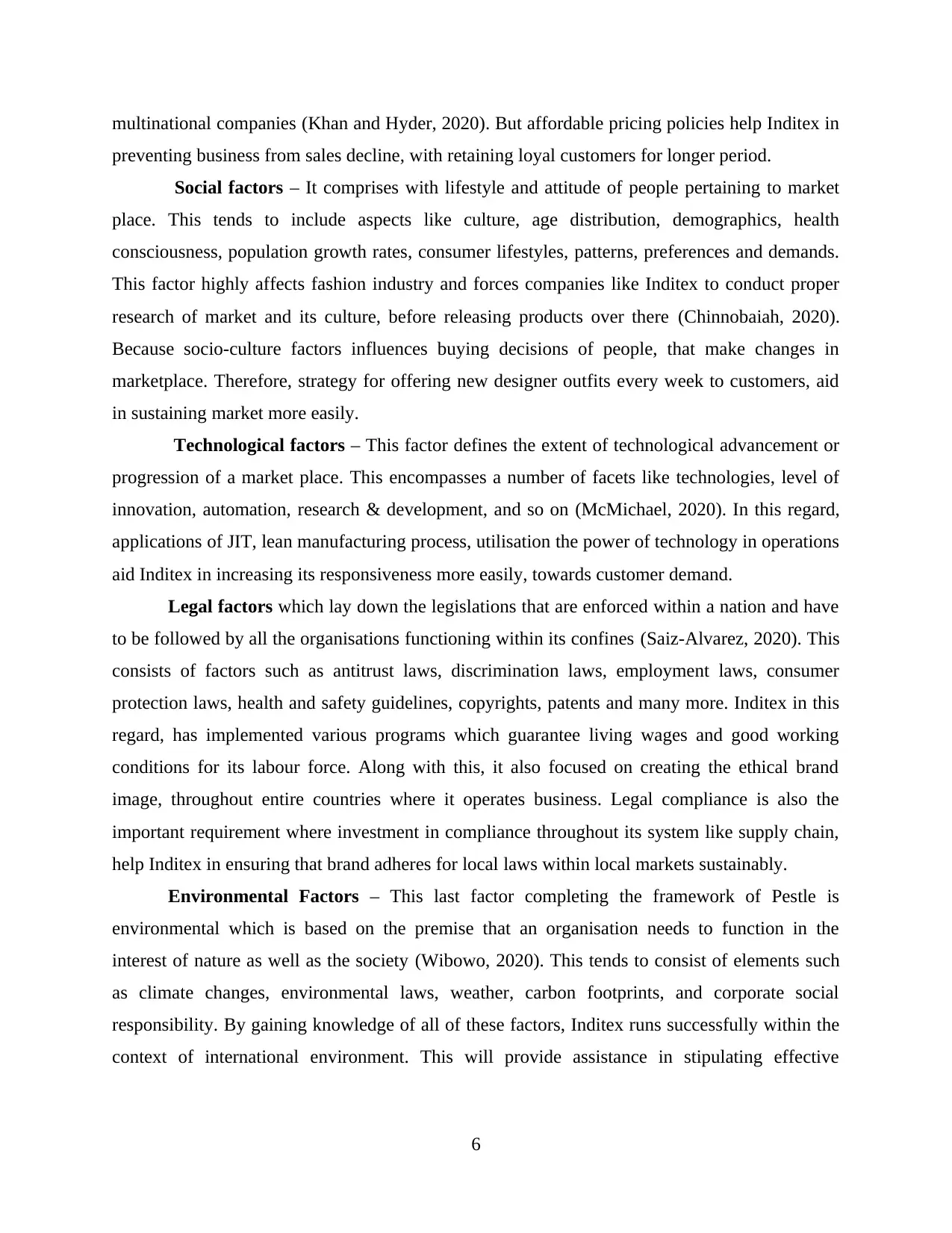
multinational companies (Khan and Hyder, 2020). But affordable pricing policies help Inditex in
preventing business from sales decline, with retaining loyal customers for longer period.
Social factors – It comprises with lifestyle and attitude of people pertaining to market
place. This tends to include aspects like culture, age distribution, demographics, health
consciousness, population growth rates, consumer lifestyles, patterns, preferences and demands.
This factor highly affects fashion industry and forces companies like Inditex to conduct proper
research of market and its culture, before releasing products over there (Chinnobaiah, 2020).
Because socio-culture factors influences buying decisions of people, that make changes in
marketplace. Therefore, strategy for offering new designer outfits every week to customers, aid
in sustaining market more easily.
Technological factors – This factor defines the extent of technological advancement or
progression of a market place. This encompasses a number of facets like technologies, level of
innovation, automation, research & development, and so on (McMichael, 2020). In this regard,
applications of JIT, lean manufacturing process, utilisation the power of technology in operations
aid Inditex in increasing its responsiveness more easily, towards customer demand.
Legal factors which lay down the legislations that are enforced within a nation and have
to be followed by all the organisations functioning within its confines (Saiz-Alvarez, 2020). This
consists of factors such as antitrust laws, discrimination laws, employment laws, consumer
protection laws, health and safety guidelines, copyrights, patents and many more. Inditex in this
regard, has implemented various programs which guarantee living wages and good working
conditions for its labour force. Along with this, it also focused on creating the ethical brand
image, throughout entire countries where it operates business. Legal compliance is also the
important requirement where investment in compliance throughout its system like supply chain,
help Inditex in ensuring that brand adheres for local laws within local markets sustainably.
Environmental Factors – This last factor completing the framework of Pestle is
environmental which is based on the premise that an organisation needs to function in the
interest of nature as well as the society (Wibowo, 2020). This tends to consist of elements such
as climate changes, environmental laws, weather, carbon footprints, and corporate social
responsibility. By gaining knowledge of all of these factors, Inditex runs successfully within the
context of international environment. This will provide assistance in stipulating effective
6
preventing business from sales decline, with retaining loyal customers for longer period.
Social factors – It comprises with lifestyle and attitude of people pertaining to market
place. This tends to include aspects like culture, age distribution, demographics, health
consciousness, population growth rates, consumer lifestyles, patterns, preferences and demands.
This factor highly affects fashion industry and forces companies like Inditex to conduct proper
research of market and its culture, before releasing products over there (Chinnobaiah, 2020).
Because socio-culture factors influences buying decisions of people, that make changes in
marketplace. Therefore, strategy for offering new designer outfits every week to customers, aid
in sustaining market more easily.
Technological factors – This factor defines the extent of technological advancement or
progression of a market place. This encompasses a number of facets like technologies, level of
innovation, automation, research & development, and so on (McMichael, 2020). In this regard,
applications of JIT, lean manufacturing process, utilisation the power of technology in operations
aid Inditex in increasing its responsiveness more easily, towards customer demand.
Legal factors which lay down the legislations that are enforced within a nation and have
to be followed by all the organisations functioning within its confines (Saiz-Alvarez, 2020). This
consists of factors such as antitrust laws, discrimination laws, employment laws, consumer
protection laws, health and safety guidelines, copyrights, patents and many more. Inditex in this
regard, has implemented various programs which guarantee living wages and good working
conditions for its labour force. Along with this, it also focused on creating the ethical brand
image, throughout entire countries where it operates business. Legal compliance is also the
important requirement where investment in compliance throughout its system like supply chain,
help Inditex in ensuring that brand adheres for local laws within local markets sustainably.
Environmental Factors – This last factor completing the framework of Pestle is
environmental which is based on the premise that an organisation needs to function in the
interest of nature as well as the society (Wibowo, 2020). This tends to consist of elements such
as climate changes, environmental laws, weather, carbon footprints, and corporate social
responsibility. By gaining knowledge of all of these factors, Inditex runs successfully within the
context of international environment. This will provide assistance in stipulating effective
6
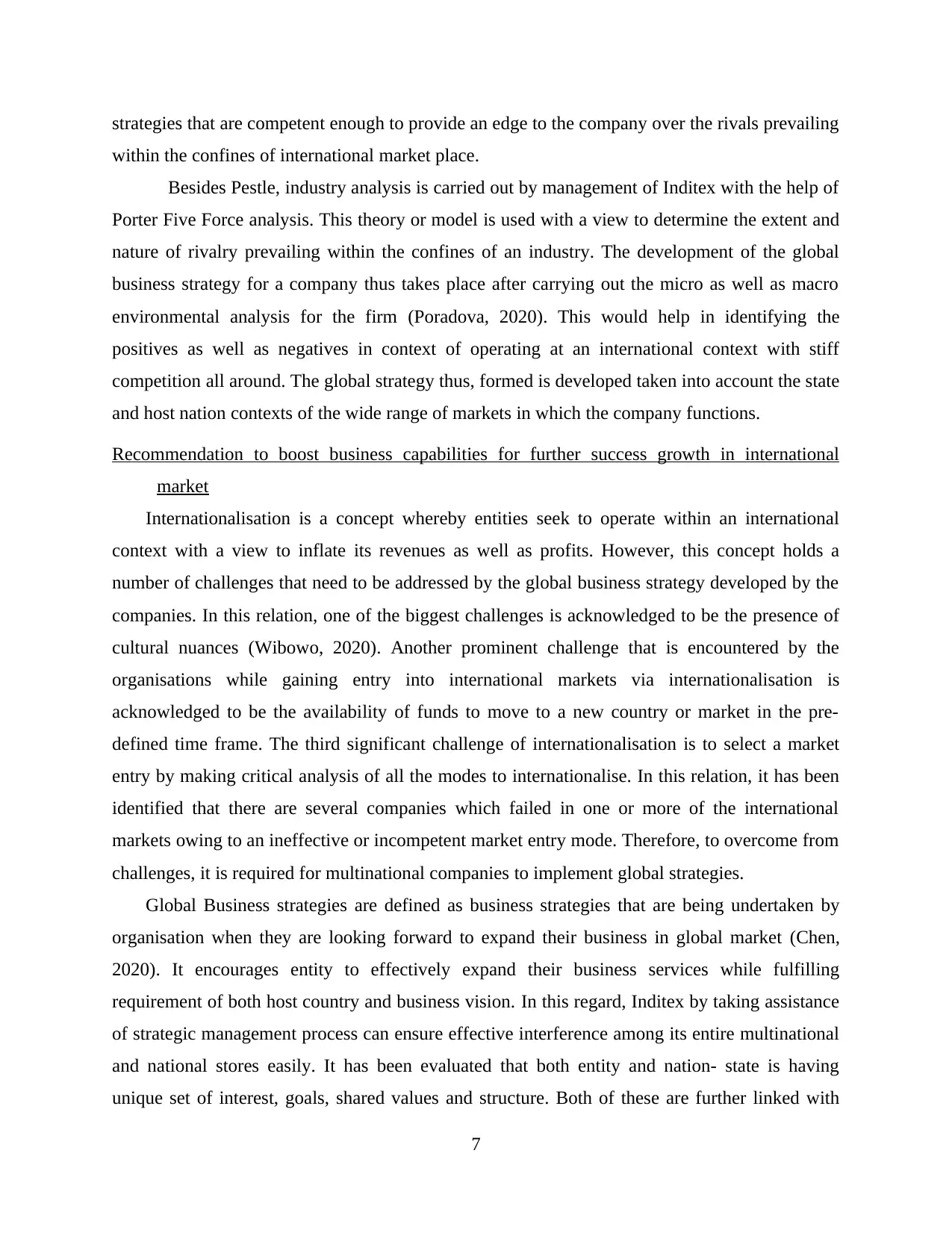
strategies that are competent enough to provide an edge to the company over the rivals prevailing
within the confines of international market place.
Besides Pestle, industry analysis is carried out by management of Inditex with the help of
Porter Five Force analysis. This theory or model is used with a view to determine the extent and
nature of rivalry prevailing within the confines of an industry. The development of the global
business strategy for a company thus takes place after carrying out the micro as well as macro
environmental analysis for the firm (Poradova, 2020). This would help in identifying the
positives as well as negatives in context of operating at an international context with stiff
competition all around. The global strategy thus, formed is developed taken into account the state
and host nation contexts of the wide range of markets in which the company functions.
Recommendation to boost business capabilities for further success growth in international
market
Internationalisation is a concept whereby entities seek to operate within an international
context with a view to inflate its revenues as well as profits. However, this concept holds a
number of challenges that need to be addressed by the global business strategy developed by the
companies. In this relation, one of the biggest challenges is acknowledged to be the presence of
cultural nuances (Wibowo, 2020). Another prominent challenge that is encountered by the
organisations while gaining entry into international markets via internationalisation is
acknowledged to be the availability of funds to move to a new country or market in the pre-
defined time frame. The third significant challenge of internationalisation is to select a market
entry by making critical analysis of all the modes to internationalise. In this relation, it has been
identified that there are several companies which failed in one or more of the international
markets owing to an ineffective or incompetent market entry mode. Therefore, to overcome from
challenges, it is required for multinational companies to implement global strategies.
Global Business strategies are defined as business strategies that are being undertaken by
organisation when they are looking forward to expand their business in global market (Chen,
2020). It encourages entity to effectively expand their business services while fulfilling
requirement of both host country and business vision. In this regard, Inditex by taking assistance
of strategic management process can ensure effective interference among its entire multinational
and national stores easily. It has been evaluated that both entity and nation- state is having
unique set of interest, goals, shared values and structure. Both of these are further linked with
7
within the confines of international market place.
Besides Pestle, industry analysis is carried out by management of Inditex with the help of
Porter Five Force analysis. This theory or model is used with a view to determine the extent and
nature of rivalry prevailing within the confines of an industry. The development of the global
business strategy for a company thus takes place after carrying out the micro as well as macro
environmental analysis for the firm (Poradova, 2020). This would help in identifying the
positives as well as negatives in context of operating at an international context with stiff
competition all around. The global strategy thus, formed is developed taken into account the state
and host nation contexts of the wide range of markets in which the company functions.
Recommendation to boost business capabilities for further success growth in international
market
Internationalisation is a concept whereby entities seek to operate within an international
context with a view to inflate its revenues as well as profits. However, this concept holds a
number of challenges that need to be addressed by the global business strategy developed by the
companies. In this relation, one of the biggest challenges is acknowledged to be the presence of
cultural nuances (Wibowo, 2020). Another prominent challenge that is encountered by the
organisations while gaining entry into international markets via internationalisation is
acknowledged to be the availability of funds to move to a new country or market in the pre-
defined time frame. The third significant challenge of internationalisation is to select a market
entry by making critical analysis of all the modes to internationalise. In this relation, it has been
identified that there are several companies which failed in one or more of the international
markets owing to an ineffective or incompetent market entry mode. Therefore, to overcome from
challenges, it is required for multinational companies to implement global strategies.
Global Business strategies are defined as business strategies that are being undertaken by
organisation when they are looking forward to expand their business in global market (Chen,
2020). It encourages entity to effectively expand their business services while fulfilling
requirement of both host country and business vision. In this regard, Inditex by taking assistance
of strategic management process can ensure effective interference among its entire multinational
and national stores easily. It has been evaluated that both entity and nation- state is having
unique set of interest, goals, shared values and structure. Both of these are further linked with
7
Secure Best Marks with AI Grader
Need help grading? Try our AI Grader for instant feedback on your assignments.
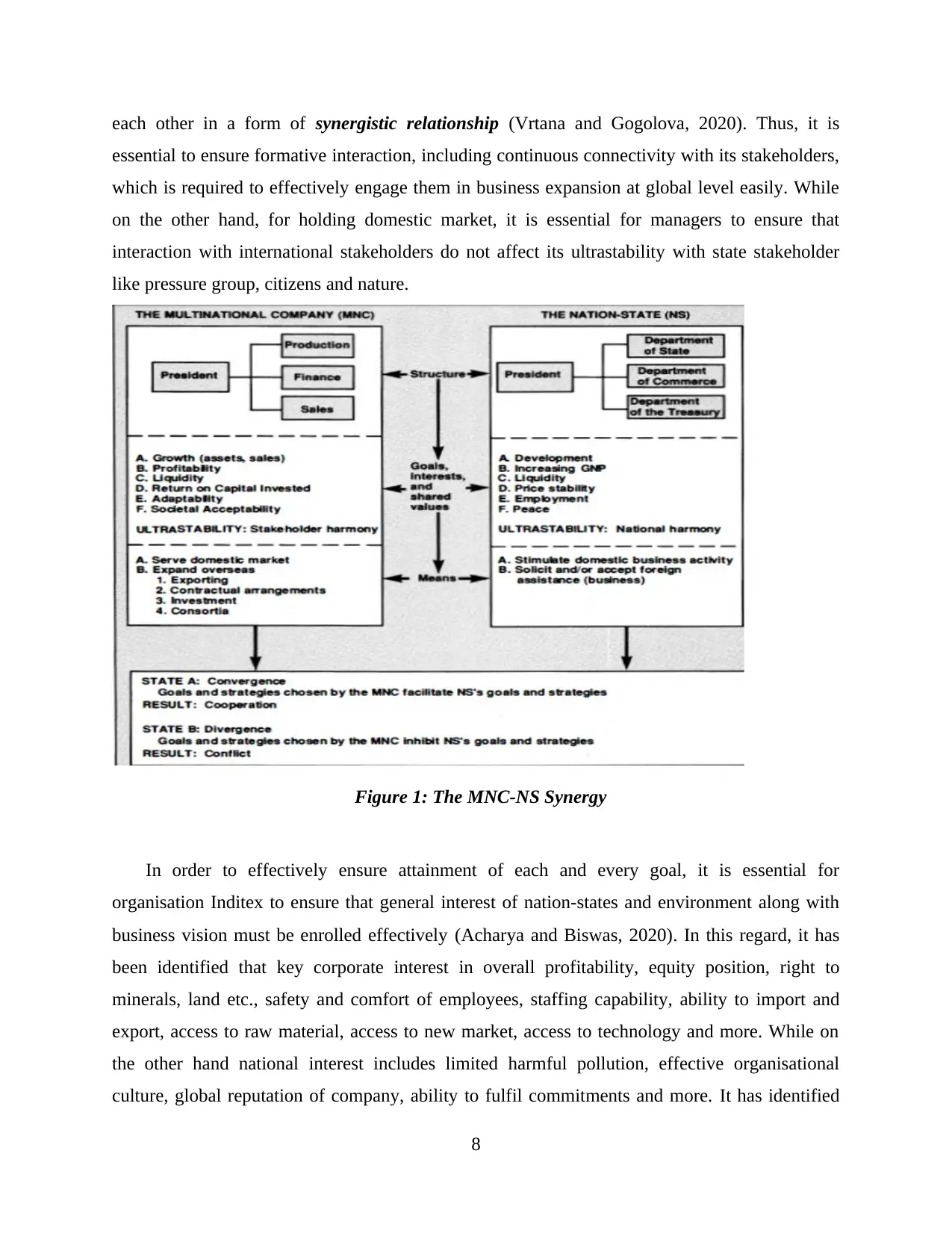
each other in a form of synergistic relationship (Vrtana and Gogolova, 2020). Thus, it is
essential to ensure formative interaction, including continuous connectivity with its stakeholders,
which is required to effectively engage them in business expansion at global level easily. While
on the other hand, for holding domestic market, it is essential for managers to ensure that
interaction with international stakeholders do not affect its ultrastability with state stakeholder
like pressure group, citizens and nature.
Figure 1: The MNC-NS Synergy
In order to effectively ensure attainment of each and every goal, it is essential for
organisation Inditex to ensure that general interest of nation-states and environment along with
business vision must be enrolled effectively (Acharya and Biswas, 2020). In this regard, it has
been identified that key corporate interest in overall profitability, equity position, right to
minerals, land etc., safety and comfort of employees, staffing capability, ability to import and
export, access to raw material, access to new market, access to technology and more. While on
the other hand national interest includes limited harmful pollution, effective organisational
culture, global reputation of company, ability to fulfil commitments and more. It has identified
8
essential to ensure formative interaction, including continuous connectivity with its stakeholders,
which is required to effectively engage them in business expansion at global level easily. While
on the other hand, for holding domestic market, it is essential for managers to ensure that
interaction with international stakeholders do not affect its ultrastability with state stakeholder
like pressure group, citizens and nature.
Figure 1: The MNC-NS Synergy
In order to effectively ensure attainment of each and every goal, it is essential for
organisation Inditex to ensure that general interest of nation-states and environment along with
business vision must be enrolled effectively (Acharya and Biswas, 2020). In this regard, it has
been identified that key corporate interest in overall profitability, equity position, right to
minerals, land etc., safety and comfort of employees, staffing capability, ability to import and
export, access to raw material, access to new market, access to technology and more. While on
the other hand national interest includes limited harmful pollution, effective organisational
culture, global reputation of company, ability to fulfil commitments and more. It has identified
8
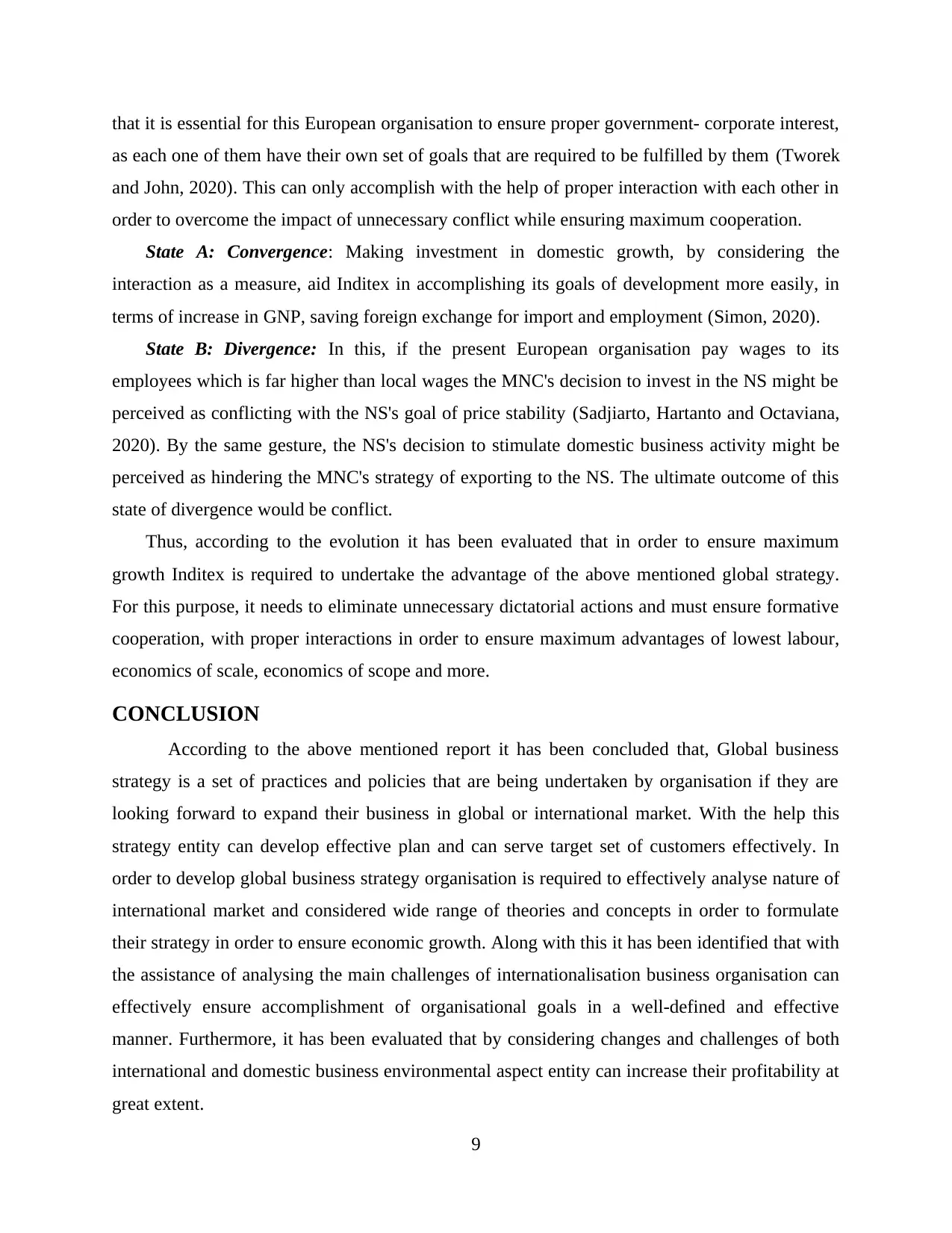
that it is essential for this European organisation to ensure proper government- corporate interest,
as each one of them have their own set of goals that are required to be fulfilled by them (Tworek
and John, 2020). This can only accomplish with the help of proper interaction with each other in
order to overcome the impact of unnecessary conflict while ensuring maximum cooperation.
State A: Convergence: Making investment in domestic growth, by considering the
interaction as a measure, aid Inditex in accomplishing its goals of development more easily, in
terms of increase in GNP, saving foreign exchange for import and employment (Simon, 2020).
State B: Divergence: In this, if the present European organisation pay wages to its
employees which is far higher than local wages the MNC's decision to invest in the NS might be
perceived as conflicting with the NS's goal of price stability (Sadjiarto, Hartanto and Octaviana,
2020). By the same gesture, the NS's decision to stimulate domestic business activity might be
perceived as hindering the MNC's strategy of exporting to the NS. The ultimate outcome of this
state of divergence would be conflict.
Thus, according to the evolution it has been evaluated that in order to ensure maximum
growth Inditex is required to undertake the advantage of the above mentioned global strategy.
For this purpose, it needs to eliminate unnecessary dictatorial actions and must ensure formative
cooperation, with proper interactions in order to ensure maximum advantages of lowest labour,
economics of scale, economics of scope and more.
CONCLUSION
According to the above mentioned report it has been concluded that, Global business
strategy is a set of practices and policies that are being undertaken by organisation if they are
looking forward to expand their business in global or international market. With the help this
strategy entity can develop effective plan and can serve target set of customers effectively. In
order to develop global business strategy organisation is required to effectively analyse nature of
international market and considered wide range of theories and concepts in order to formulate
their strategy in order to ensure economic growth. Along with this it has been identified that with
the assistance of analysing the main challenges of internationalisation business organisation can
effectively ensure accomplishment of organisational goals in a well-defined and effective
manner. Furthermore, it has been evaluated that by considering changes and challenges of both
international and domestic business environmental aspect entity can increase their profitability at
great extent.
9
as each one of them have their own set of goals that are required to be fulfilled by them (Tworek
and John, 2020). This can only accomplish with the help of proper interaction with each other in
order to overcome the impact of unnecessary conflict while ensuring maximum cooperation.
State A: Convergence: Making investment in domestic growth, by considering the
interaction as a measure, aid Inditex in accomplishing its goals of development more easily, in
terms of increase in GNP, saving foreign exchange for import and employment (Simon, 2020).
State B: Divergence: In this, if the present European organisation pay wages to its
employees which is far higher than local wages the MNC's decision to invest in the NS might be
perceived as conflicting with the NS's goal of price stability (Sadjiarto, Hartanto and Octaviana,
2020). By the same gesture, the NS's decision to stimulate domestic business activity might be
perceived as hindering the MNC's strategy of exporting to the NS. The ultimate outcome of this
state of divergence would be conflict.
Thus, according to the evolution it has been evaluated that in order to ensure maximum
growth Inditex is required to undertake the advantage of the above mentioned global strategy.
For this purpose, it needs to eliminate unnecessary dictatorial actions and must ensure formative
cooperation, with proper interactions in order to ensure maximum advantages of lowest labour,
economics of scale, economics of scope and more.
CONCLUSION
According to the above mentioned report it has been concluded that, Global business
strategy is a set of practices and policies that are being undertaken by organisation if they are
looking forward to expand their business in global or international market. With the help this
strategy entity can develop effective plan and can serve target set of customers effectively. In
order to develop global business strategy organisation is required to effectively analyse nature of
international market and considered wide range of theories and concepts in order to formulate
their strategy in order to ensure economic growth. Along with this it has been identified that with
the assistance of analysing the main challenges of internationalisation business organisation can
effectively ensure accomplishment of organisational goals in a well-defined and effective
manner. Furthermore, it has been evaluated that by considering changes and challenges of both
international and domestic business environmental aspect entity can increase their profitability at
great extent.
9
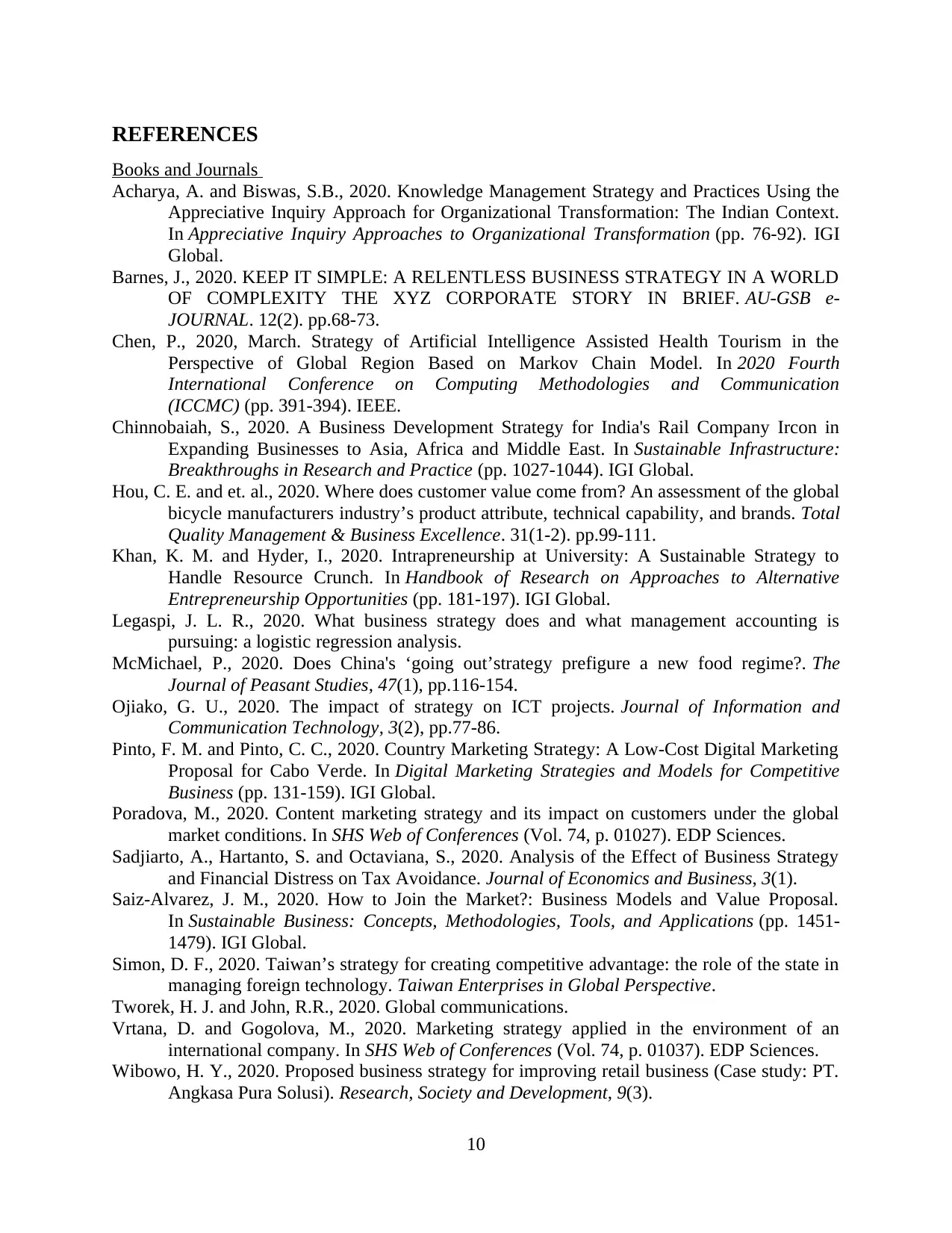
REFERENCES
Books and Journals
Acharya, A. and Biswas, S.B., 2020. Knowledge Management Strategy and Practices Using the
Appreciative Inquiry Approach for Organizational Transformation: The Indian Context.
In Appreciative Inquiry Approaches to Organizational Transformation (pp. 76-92). IGI
Global.
Barnes, J., 2020. KEEP IT SIMPLE: A RELENTLESS BUSINESS STRATEGY IN A WORLD
OF COMPLEXITY THE XYZ CORPORATE STORY IN BRIEF. AU-GSB e-
JOURNAL. 12(2). pp.68-73.
Chen, P., 2020, March. Strategy of Artificial Intelligence Assisted Health Tourism in the
Perspective of Global Region Based on Markov Chain Model. In 2020 Fourth
International Conference on Computing Methodologies and Communication
(ICCMC) (pp. 391-394). IEEE.
Chinnobaiah, S., 2020. A Business Development Strategy for India's Rail Company Ircon in
Expanding Businesses to Asia, Africa and Middle East. In Sustainable Infrastructure:
Breakthroughs in Research and Practice (pp. 1027-1044). IGI Global.
Hou, C. E. and et. al., 2020. Where does customer value come from? An assessment of the global
bicycle manufacturers industry’s product attribute, technical capability, and brands. Total
Quality Management & Business Excellence. 31(1-2). pp.99-111.
Khan, K. M. and Hyder, I., 2020. Intrapreneurship at University: A Sustainable Strategy to
Handle Resource Crunch. In Handbook of Research on Approaches to Alternative
Entrepreneurship Opportunities (pp. 181-197). IGI Global.
Legaspi, J. L. R., 2020. What business strategy does and what management accounting is
pursuing: a logistic regression analysis.
McMichael, P., 2020. Does China's ‘going out’strategy prefigure a new food regime?. The
Journal of Peasant Studies, 47(1), pp.116-154.
Ojiako, G. U., 2020. The impact of strategy on ICT projects. Journal of Information and
Communication Technology, 3(2), pp.77-86.
Pinto, F. M. and Pinto, C. C., 2020. Country Marketing Strategy: A Low-Cost Digital Marketing
Proposal for Cabo Verde. In Digital Marketing Strategies and Models for Competitive
Business (pp. 131-159). IGI Global.
Poradova, M., 2020. Content marketing strategy and its impact on customers under the global
market conditions. In SHS Web of Conferences (Vol. 74, p. 01027). EDP Sciences.
Sadjiarto, A., Hartanto, S. and Octaviana, S., 2020. Analysis of the Effect of Business Strategy
and Financial Distress on Tax Avoidance. Journal of Economics and Business, 3(1).
Saiz-Alvarez, J. M., 2020. How to Join the Market?: Business Models and Value Proposal.
In Sustainable Business: Concepts, Methodologies, Tools, and Applications (pp. 1451-
1479). IGI Global.
Simon, D. F., 2020. Taiwan’s strategy for creating competitive advantage: the role of the state in
managing foreign technology. Taiwan Enterprises in Global Perspective.
Tworek, H. J. and John, R.R., 2020. Global communications.
Vrtana, D. and Gogolova, M., 2020. Marketing strategy applied in the environment of an
international company. In SHS Web of Conferences (Vol. 74, p. 01037). EDP Sciences.
Wibowo, H. Y., 2020. Proposed business strategy for improving retail business (Case study: PT.
Angkasa Pura Solusi). Research, Society and Development, 9(3).
10
Books and Journals
Acharya, A. and Biswas, S.B., 2020. Knowledge Management Strategy and Practices Using the
Appreciative Inquiry Approach for Organizational Transformation: The Indian Context.
In Appreciative Inquiry Approaches to Organizational Transformation (pp. 76-92). IGI
Global.
Barnes, J., 2020. KEEP IT SIMPLE: A RELENTLESS BUSINESS STRATEGY IN A WORLD
OF COMPLEXITY THE XYZ CORPORATE STORY IN BRIEF. AU-GSB e-
JOURNAL. 12(2). pp.68-73.
Chen, P., 2020, March. Strategy of Artificial Intelligence Assisted Health Tourism in the
Perspective of Global Region Based on Markov Chain Model. In 2020 Fourth
International Conference on Computing Methodologies and Communication
(ICCMC) (pp. 391-394). IEEE.
Chinnobaiah, S., 2020. A Business Development Strategy for India's Rail Company Ircon in
Expanding Businesses to Asia, Africa and Middle East. In Sustainable Infrastructure:
Breakthroughs in Research and Practice (pp. 1027-1044). IGI Global.
Hou, C. E. and et. al., 2020. Where does customer value come from? An assessment of the global
bicycle manufacturers industry’s product attribute, technical capability, and brands. Total
Quality Management & Business Excellence. 31(1-2). pp.99-111.
Khan, K. M. and Hyder, I., 2020. Intrapreneurship at University: A Sustainable Strategy to
Handle Resource Crunch. In Handbook of Research on Approaches to Alternative
Entrepreneurship Opportunities (pp. 181-197). IGI Global.
Legaspi, J. L. R., 2020. What business strategy does and what management accounting is
pursuing: a logistic regression analysis.
McMichael, P., 2020. Does China's ‘going out’strategy prefigure a new food regime?. The
Journal of Peasant Studies, 47(1), pp.116-154.
Ojiako, G. U., 2020. The impact of strategy on ICT projects. Journal of Information and
Communication Technology, 3(2), pp.77-86.
Pinto, F. M. and Pinto, C. C., 2020. Country Marketing Strategy: A Low-Cost Digital Marketing
Proposal for Cabo Verde. In Digital Marketing Strategies and Models for Competitive
Business (pp. 131-159). IGI Global.
Poradova, M., 2020. Content marketing strategy and its impact on customers under the global
market conditions. In SHS Web of Conferences (Vol. 74, p. 01027). EDP Sciences.
Sadjiarto, A., Hartanto, S. and Octaviana, S., 2020. Analysis of the Effect of Business Strategy
and Financial Distress on Tax Avoidance. Journal of Economics and Business, 3(1).
Saiz-Alvarez, J. M., 2020. How to Join the Market?: Business Models and Value Proposal.
In Sustainable Business: Concepts, Methodologies, Tools, and Applications (pp. 1451-
1479). IGI Global.
Simon, D. F., 2020. Taiwan’s strategy for creating competitive advantage: the role of the state in
managing foreign technology. Taiwan Enterprises in Global Perspective.
Tworek, H. J. and John, R.R., 2020. Global communications.
Vrtana, D. and Gogolova, M., 2020. Marketing strategy applied in the environment of an
international company. In SHS Web of Conferences (Vol. 74, p. 01037). EDP Sciences.
Wibowo, H. Y., 2020. Proposed business strategy for improving retail business (Case study: PT.
Angkasa Pura Solusi). Research, Society and Development, 9(3).
10
Paraphrase This Document
Need a fresh take? Get an instant paraphrase of this document with our AI Paraphraser

11
1 out of 14
Related Documents
Your All-in-One AI-Powered Toolkit for Academic Success.
+13062052269
info@desklib.com
Available 24*7 on WhatsApp / Email
![[object Object]](/_next/static/media/star-bottom.7253800d.svg)
Unlock your academic potential
© 2024 | Zucol Services PVT LTD | All rights reserved.





